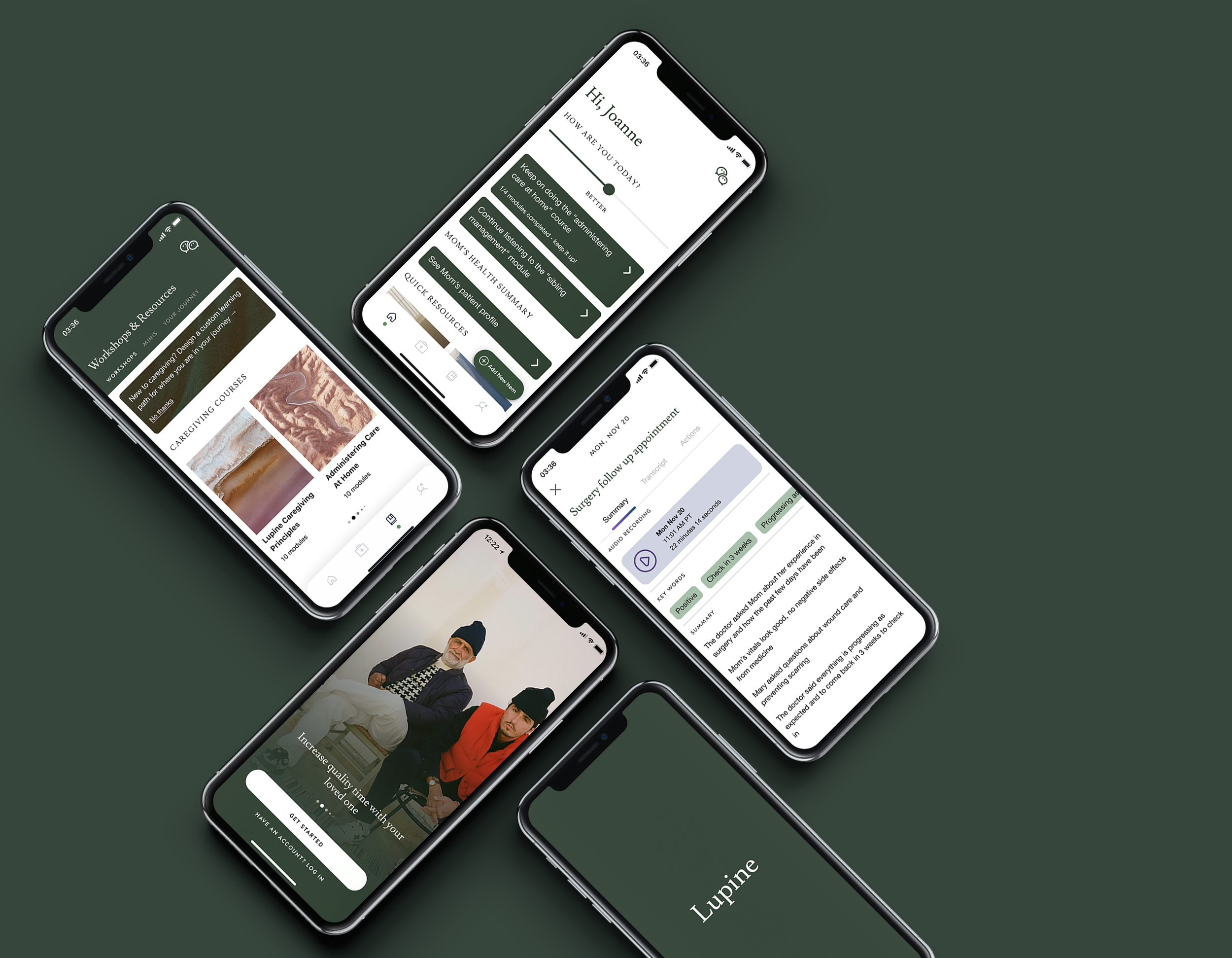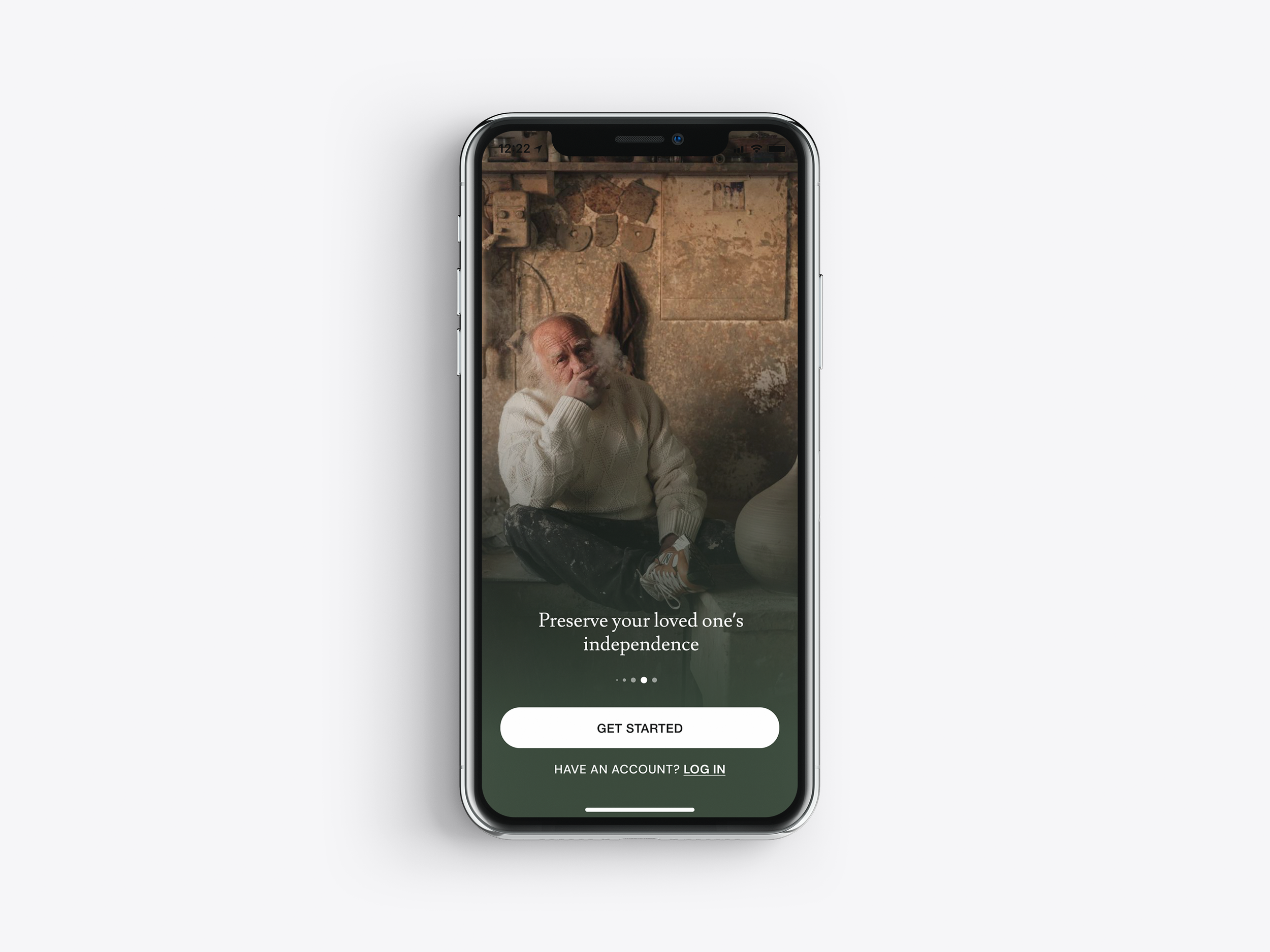How I conceptualized a product and designed a clickable prototype for VC fundraising
LupineCare
Consumer mobile app | In developmentOwn all aspects of design for a consumer startup focused on caregiving for aging loved onesOVERVIEW
Lupine Care is an early-stage startup dedicated to supporting and empowering millennial caregivers who are beginning to care for their aging parents. Recognizing the unique challenges and fears faced by this demographic, Lupine Care aims to create a comprehensive mobile app that provides a centralized platform for accessing information, resources, and support. By helping caregivers navigate this new role with confidence and compassion, the app addresses the specific needs of millennial caregivers, who often find themselves unprepared and overwhelmed when taking on this responsibility. As the (volunteer) head of product design, I lead all user research and design of digital experiences.
DESIGN PROCESS
User Research and Human-Centered Design: To deeply understand millennial caregivers' needs, fears, and preferences, the design process began with extensive user research. This involved conducting surveys, interviews, and focus groups with millennial caregivers to gain insights into their unique challenges and experiences. The research also explored the caregiver journey across medical, payer, and family systems, revealing the complexities and pain points caregivers face when navigating these systems. Based on these findings, detailed user personas were developed to guide the app's design and content creation.
Caregiver Journey Mapping: The research findings were used to create comprehensive journey maps that documented the caregiver experience across various touchpoints, including interactions with healthcare providers, insurance companies, and family members. These journey maps highlighted the emotional highs and lows caregivers experience, as well as the key moments where they require support and resources. By understanding the caregiver journey, the team identified opportunities to provide targeted support and streamline processes through the app.
Visual Design: I developed a cohesive visual language for the app, including a color palette, typography, and iconography aligned with the astrology theme. The color scheme consisted of greens, purples, and golds to evoke trust without being too “medical”-y. The photography style is modern and evocative, seeking to feel calm and supportive of the users’ current life experiences.
UX/UI Design: I designed high-fidelity mockups of key screens, including the onboarding flow, user profile, match suggestions, and messaging interface. I paid close attention to usability principles, ensuring the interface was intuitive, easy to navigate, and visually appealing. I incorporated subtle animations and transitions to enhance the user experience and create a sense of delight.
Interactive Prototype: I created an interactive prototype using prototyping tools to simulate the user flow and test the usability of the redesigned app. The prototype allowed stakeholders to experience the app firsthand and provide feedback before development.
PRODUCT OUTCOMES
The Lupine Care mobile app is currently in prototype, and the app features:
Educational content: A library of articles, videos, and podcasts covering topics such as accepting the caregiver role, creating a safe home environment, legal and financial planning, and effective communication strategies.
Self-care resources: Guided mindfulness exercises, stress management techniques, and self-care tips to help caregivers maintain their own well-being and avoid burnout.
Community support: A forum where caregivers can connect with others in similar situations, share experiences, and seek advice. The app also facilitates local support group meetings and events.
AI copilot and Care coordination tools: To further support caregivers, Lupine Care designed an AI copilot feature that empowers users with the information and resources they need to navigate doctor's appointments, manage care at home, answer questions, and share insights with their care pod. The team leveraged a conversational UX/UI pattern to design the MVP of this feature, focusing on creating a natural and intuitive interaction between the user and the AI copilot. This AI copilot integrates with a centralized calendar for managing appointments, a medication tracker, and a document storage feature for organizing important paperwork.
AI COPILOT DESIGN
Leveraging AI, Lupine aims to empower new caregivers with the information and resources to best attend doctor’s appointments, manage care at home, answer questions, and share these insights with their care pod.
I leveraged a conversational UX/UI pattern to design the MVP of this AI copilot feature. As the product goes through testing, I plan on evolving its functionality as user feedback comes in.

BUSINESS IMPACT
In early testing, the Lupine Care app has had a significant impact on the lives of millennial caregivers:
Increased caregiver confidence: Users reported feeling more prepared and confident in their caregiving roles after using the app's resources and support features.
Improved care coordination: The app's tools have helped caregivers stay organized and manage their responsibilities more effectively, reducing stress and burnout.
Enhanced community support: The app's community features have connected caregivers with others in similar situations, providing a valuable source of emotional support and practical advice.
Positive user feedback: The app has received overwhelmingly positive reviews, with many expressing gratitude for Lupine Care's comprehensive support and resources.
As Lupine Care continues to grow and evolve, the team remains committed to iterating on the app's features and content based on user feedback, ensuring that it remains a valuable and impactful resource for millennial caregivers.









